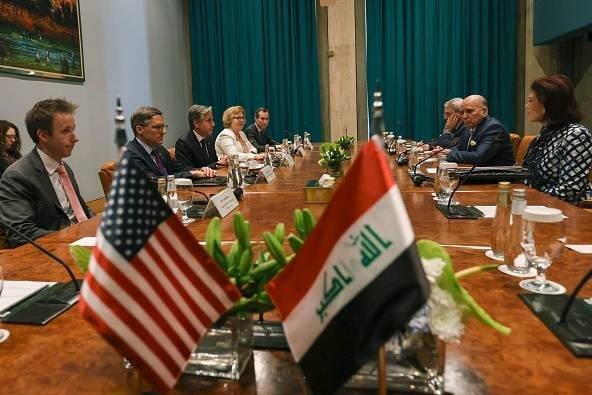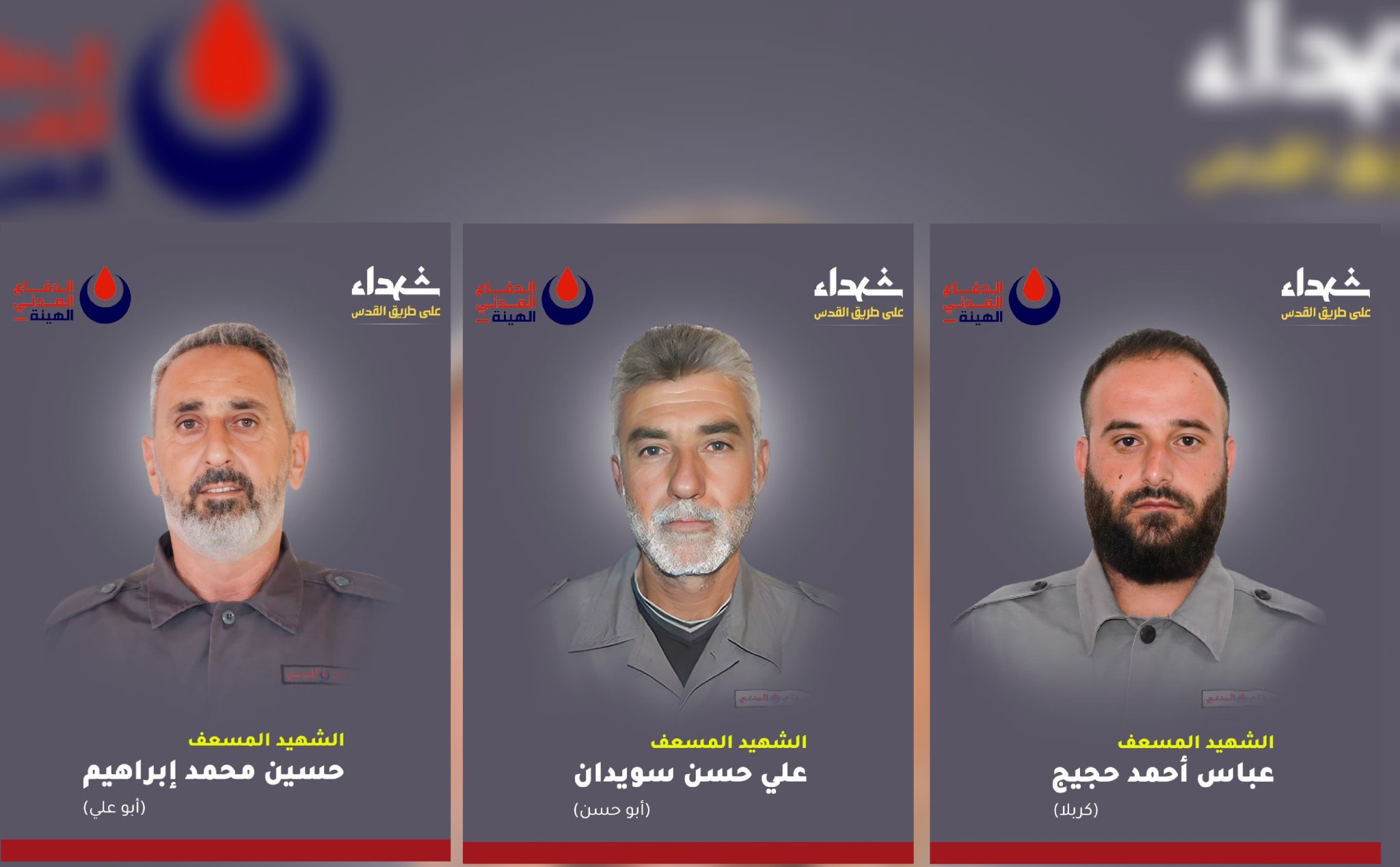The Hezbollah chief said talks underway with the Lebanese government about Iran supplying the country with refined oil products in exchange for Lebanese pounds.

Iran Press video shows the head of Lebanese Shia party Hezbollah, Hassan Nasrallah, delivering a televised speech from an undisclosed location, July 7. (AFP)
BEIRUT – In a confrontational 100-minute televised speech Tuesday, leader of the Iran-backed Hezbollah group Hassan Nasrallah laid out again the idea of turning east to resolve the country’s deteriorating economic crisis, saying Iran can supply Lebanon with oil and blaming Washington’s policies for the predicament the country is facing.
In recent months, Hezbollah has been attempting to seize on Lebanon’s economic downfall to pave the way for it to reshape a “new Lebanon” with an eastern orientation, away from any Western influence.
In Tuesday’s speech, Nasrallah reiterated this idea, linking Lebanon’s crisis to other crises ravaging the entire Iranian axis.
However, he indicated that Hezbollah is not simply resorting to rhetoric to advance its agenda as it is now ready to take actions as well.
Iranian fuel to the rescue, again
Nasrallah said Tuesday that Hezbollah is in talks with the Lebanese government about the possibility of Iran supplying the country with refined oil products in exchange for Lebanese pounds.
He added a “calm discussion” was underway with the Beirut government over the idea that would ease the pressure on Beirut’s hard currency reserves.
He said China is also ready to invest in Lebanon, adding that Hezbollah has other cards to play, without elaborating.
Lebanon is suffering an acute financial crisis and hard currency liquidity crunch. The Lebanese pound has lost some 80% of its value since October, when the long-brewing crisis came to a head.
“We started a discussion…to see where this option can go,” Nasrallah said in the televised speech. “This track is moving…What’s the result going to be? I don’t know. But we have to try,” he said.
Iran will announce its official position on the matter at the appropriate moment, he added.
The idea of Iran supplying oil to Lebanon was floated by Hezbollah’s leader before.
In an appearance on June 16, Nasrallah said, “There are friendly countries like Iran that could sell us gasoline, gas, fuel, oil derivatives and other energy needs without using the dollar-based payment system.”
The radical Shia Hezbollah group, which is classified as a terrorist group by the United States, supports Prime Minister Hassan Diab’s government.
By promoting alternative ways to rescue Lebanon, the group hopes to circumvent US pressures and make Lebanon a major gateway for Tehran to break its economic isolation.
Hezbollah’s proposed alternatives, however, threaten to annihilate the major foundations on which modern Lebanon was built.
Pleading against the Caesar Act
In Tuesday’s speech, Nasrallah also said Lebanon should not observe new US sanctions against Syria under the US Ceasar Syria Civilian Protection Act, which he said would be deeply hurtful to his country if implemented.
Hezbollah’s leader noted that Syria is Lebanon’s only land route to the world, so trade would be harmed.
Losing the land route with Syria would force Lebanon to turn to Israel, which Nasrallah suggested is the aim of US sanctions and which he said is rejected.
Lebanon and Israel are technically at war and Hezbollah has fought a number of wars with Israel, the last in 2006.
The heavily indebted Lebanon is seeking financial assistance from the International Monetary Fund (IMF) but rounds of talks have not yet produced an agreement.
The new sanctions also undermine Lebanese companies’ chances of taking part in reconstruction in Syria and are expected to hamper bilateral trade between the two countries, Nasrallah said.
He noted the sanctions on Syria are aimed at creating chaos after Damascus emerged victorious in the nine-year war.
The pressure on Lebanon, he said, is aimed to bring the small country in line with US policy and force his group to give up its weapons or increase public pressure so that it does.

He urged the Lebanese government “not to succumb to the Caesar Act,” which he said aims to impoverish and bring about hunger to the people of Lebanon and Syria.
On Syria, Nasrallah said the sanctions would fail to achieve their desired effects.
“Syria’s allies who stood by it during the military, security and political war— and even if their own conditions are also difficult— they will not give up on Syria in the face of this economic war,” Nasrallah said.
Angry Diatribe against the US
Addressing the United States, Nasrallah said, “Punish us but why are you punishing the Lebanese people?” Hezbollah is already on the US sanctions list.
“Our weapons will remain in our hands. We will not go hungry and we will kill you,” he said, angrily, but did not elaborate. “We will not go hungry and we will not let our country go hungry.”
Nasrallah blamed the United States for the dollar shortage in Lebanon, saying Washington is preventing the foreign currency from coming into Lebanon and is pressuring its central bank not to inject fresh amounts into the economy.
He called the dollar crisis “a national security issue,” no longer an economic problem.
Lebanon is facing an unprecedented confluence of economic and financial crises — characterised by a severe shortage of dollars and negative economic growth.
The crises were compounded by the coronavirus pandemic that left the country in a lockdown for weeks and deepened unemployment and inflation.
In addition, new US sanctions against Syria, the toughest yet, are due to go into effect Wednesday, penalising any country or entity that does business with the Syrian government.
These factors and more tightened the noose not only on Lebanon but on Hezbollah too, prompting Nasrallah to lash out at the US’s ambassador to the country.
On Tuesday, Nasrallah blasted US Ambassador to Lebanon Dorothy Shea, describing her as a “military ruler” who has incited tensions.
Nasrallah was reacting to Shea’s accusations last month that Hezbollah had spirited away billions of dollars of state money at a time of acute economic crisis.
In an interview with Saudi-owned news channel Al-Hadath, Shea also said the US was reviewing Prime Minister Hassan Diab’s government’s links with Hezbollah, which is considered by the US as a terrorist organisation.
“Since the new ambassador arrived in Lebanon …she has dealt with Lebanon as though she is a military ruler, or a high commissary, as though she has authority,” Nasrallah said.
“Every day she attacks (Hezbollah)… she insults and offends us,” Nasrallah said in a televised speech, criticising the government for remaining silent.
“She is pushing the Lebanese towards infighting, sedition and civil strife,” he said.
Nasrallah said Hezbollah lawmakers in parliament will ask the foreign ministry to summon Shea and reprimand her.
The Lebanese Shia group and its allies command a majority in parliament and the cabinet.
Shea was already summoned for a meeting with Foreign Minister Nassif Hitti late last month following her interview with Al-Hadath, which prompted a south Lebanon judge to issue a non-binding and now-defunct order banning the Lebanese press from reporting her comments.
Shea is “interfering in appointments and in government and in the economy,” Nasrallah said.
“She is attacking the Lebanese and inciting them towards sedition and strife.”
The dispute comes as Lebanon grapples with its worst economic crisis since the 1975-1990 civil war.



